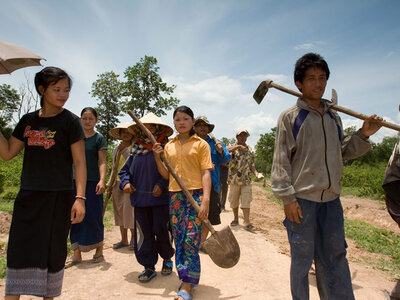Disaster risk financing
- 6 million
- people protected in 2024 with disaster risk financing products developed and supported by WFP in 37 countries
- US$361 million
- total financial coverage in 2024
- 7 million
- people protected by climate risk insurance by 2025
The growing crisis protection gap is a significant driver of global hunger, as it leaves vulnerable people without the financial support they need to recover from shocks - whether weather-related or otherwise - that threaten their lives, livelihoods and food security. This gap means that people often lack the resources to protect themselves and rebuild in the aftermath of crises, exacerbating food insecurity.
Smallholder farmers, pastoralists, small and micro entrepreneurs across the world are highly vulnerable to climate-related risks, such as droughts, floods, tropical cyclones, hurricanes and storms. They also have very limited access to the risk financing tools and services that can provide protection from the resulting financial losses. This means that they are often unable to protect themselves and rebuild in the aftermath of crises, exacerbating food insecurity.
At the same time, governments are also struggling to keep pace with the growing scale and complexity of risks. Compounding shocks - such as extreme weather events, conflict, financial crises, and pandemics - are stretching national budgets and limiting governments' ability to respond effectively to disasters.
-
Inclusive Risk Financing
-
Inclusive Risk Financing refers to financial solutions – such as savings, loans and insurance – designed to make financial protection accessible to underserved and vulnerable populations. As weather-related shocks grow in frequency and intensity, these tools play a critical role in helping communities prepare for, manage and recover from extreme weather events. Over the past ten years, WFP has unlocked access to financial services for over 10 million people through integrated risk management strategies. Building on its work with the R4 Rural Resilience Initiative WFP has evolved this model into a more comprehensive Inclusive Risk Financing approach.
-
Macro-level Risk Financing
-
Risk Layering
Related topics
In focus
‘Unseen and unheard’: Haiti weathers hunger, gangs and climate extremes
Story | 27 June 2023
Niger shows how WFP and partners can transform lives in Africa's harsh Sahel
Story | 20 April 2023
Dyke repairs engineer hopes for people fleeing floods and facing hunger in South Sudan
Story | 26 July 2023
How WFP empowers farmers in Iraq in the face of climate extremes
Story | 20 March 2023
Malawi: Devastation caused by cyclone Freddy is a ‘wake-up call on the climate crisis’
Story | 24 March 2023







